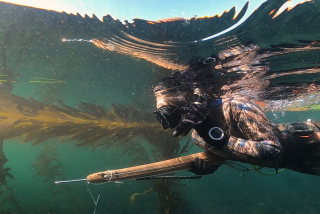Bass anxiety
- Share via
Mike LONG silently guides his bass boat along the shore toward a sunken, mossy boulder in San Vicente Lake in San Diego County. Peering through polarized sunglasses into murky green water, he spots a pair of largemouth bass spawning in the shallows and closes in on them.
Long, 39, works as a construction manager in Poway, but on the water he’s a bass-busting surgeon. He stops the boat, whips out a rod and tosses an orange plastic worm at the fish, but they ignore it. He switches to a lure that looks like a bluegill, then casts it once, twice, three times right in front of the fish. Suddenly, the bigger one rushes the rubber lure.
“We’ve got a winner,” Long says with a grin, as he sets the hook and reels in the bass. He removes the hook from the 4-pounder and plops it back into the water.
Most anglers would be delighted with a 4-pound bass but not Long. Not the man widely considered one of the nation’s best trophy bass anglers. Not the man who has nine lake records to his credit. Not the man who caught the ninth biggest bass ever -- a 20-pound, 12-ounce lunker.
Yet, despite such success, one record eludes him: landing the biggest largemouth in history. The record has stood for nearly 73 years, seemingly as unattainable as the 4-minute mile, Gordie Howe’s career goals record or Roger Maris’ single season home-run mark.
But just as those records tumbled, so too will the big bass mark. It might happen in Southern California. The region is dotted with nutrient-rich reservoirs stocked with pan-size rainbow trout that big largemouth gorge upon. Bass here -- including Florida transplants that grow to immense size -- thrive in warm waters and a long growing season.
Long has been in the vanguard of top anglers who have scoured Southern California lakes for decades searching for the top bass with the zeal of Spanish explorers seeking El Dorado.
While anglers have come close to breaking the record -- 9 of 10 of the world’s heaviest bass came from Southern California -- the biggest fish remains elusive.
Now, some scientists and veteran anglers question whether the record-busting bass will come from Southern California at all. They cite fluctuating lake levels, invasive species, excessive fishing pressure and physiological changes in the fish. A pro angler or some cheese-ball dunking, shore squatter may yet stumble upon the fish like a winning lottery ticket. But at marinas and tackle shops, there are rumblings that the window of opportunity for the monster fish may be closing.
Even a master like Long is burning out after hunting for the fish for decades. He is among some top anglers throwing in the towel. The pressure, rivalries, endless sun-scorched days on the water, the rigors of travel and sacrifice take a toll on health and family life.
“It’s kinda silly,” Long says. “It’s just a little green fish.”
But the world record bass will be anything but puny. It will be a green-backed, pot-bellied sow of a fish. Giant bass have big scales, bulky bodies like NFL offensive linemen and a maw that can swallow a duck. They are fearsome and wonderful and ugly and otherworldly.
This is probably what George Washington Perry beheld when he lifted the 22-pound, 4-ounce world record bass from a Georgia lake in 1932.
Perry won $75 worth of gear from Field & Stream magazine. But the angler who breaks his record will become an instant celebrity. He, or she, will command lucrative contracts from tackle manufacturers, resorts and boat makers. The fisherman will garner millions of dollars in speaking fees, books, videos, magazine articles, TV shows and more. The lucky angler will attain fishing immortality.
Challenging chase
The big bass quest lurched West in 1980 when a Fullerton man, Raymond Easley, soaked a crawdad in Lake Casitas near Ventura and caught a fish about 1 pound shy of the world record. During the 1990s, the world’s top bass anglers stormed Southern California reservoirs with high-octane boats, bundles of graphite rods and high expectations. They toppled lake records from San Diego to Santa Barbara. Of the 10 all-time heaviest largemouth bass, nine came from Southern California, and most were caught in the last 15 years.
Mike Arujo has been in the thick of the hunt. “I’m still gunning out there,” says Arujo, who captains a sportfishing boat in the summer and spends most spring days chasing spawning bass at Castaic Lake. He took a 21-pound, 12-ounce bass there in 1991 -- the third biggest bass on record.
Trophy bass anglers are a different breed. A restless bunch, they stalk fish all over the water, rather than idly waiting for fish to swim to them. They invent new lures, crisscross the nation for tournaments and virtually live on the water when the spring bite turns on.
They own big trucks, glossy metal-flake boats, high-tech rods and reels and enough lures to stock a small tackle shop. They fight over fishing spots. Some stuff bass with lead weights and cement to tip the scales. Cheating is so common that the International Game Fish Assn. requires polygraph tests for record claims. Two years ago, a Florida fishing club rescinded its offer to reward members $8 million for the record bass because of unethical fishing tactics.
Despite the onslaught, the record still stands. In Southern California, the search for the biggest bass has hit a dry spell. Anglers here have been catching fewer giant largemouth.
“The odds of getting a record are pretty tough,” says Mike Guisti, a Department of Fish and Game biologist and longtime fixture at the region’s lakes. “In the Los Angeles area, we haven’t seen a 20 [pound bass] in four or five years.”
Why? In recent years, Southern California’s big reservoirs have undergone profound changes.
Prolonged drought nearly drained Lake Hodges near San Diego and dramatically lowered other reservoirs, replacing spawning habitat with mud-cracked shore. At Castaic Lake, Guisti says a striped-bass invasion leaves less forage for the largemouth.
Northern-strain largemouth, a smaller version of bass found in some lakes, may dilute the gene pool. Also, Guisti says Southern California bass may undergo a peculiar physiological change as they develop: Because they bulk up fast in warm water on a diet of planted trout, rapid growth weakens them in the long run, reducing their ability to compete for food and attain gargantuan size in old age.
Other states have a good shot at producing the record bass too. Florida and the Deep South have huge largemouth, and more and more anglers are going to Mexico to find big fish. In Texas, wildlife officials breed big bass to stock lakes.
Some top anglers say finding the biggest bass is not worth the aggravation. Many have dropped out of the hunt.
Robert Crupi, a Los Angeles motorcycle cop who caught a fish in 1991 that was 4 ounces shy of Perry’s record, says the time he spent on the water chasing the elusive record nearly destroyed his home life. Each time he caught a big fish, he says his rivals spread rumors that he had cheated. So he gave up the hunt. Now, he teaches others how to fish, hoping one of his students will break the record.
“I’m glad to have achieved the goals I’ve achieved and if they fell short ...” he says, “oh, well.”
New equilibrium
An afternoon wind turns San Vicente Lake choppy, so Long seeks shelter in one of his favorite coves where storm runoff cascades in a small waterfall and spills into the lake.
Long sheds clothes until he wears shorts, sandals and a T-shirt. He switches to a better pair of sunglasses, while his black-billed cap cuts glare so he can spot fish underwater.
Sportswriters and other anglers consider Long the front-runner to break the record. They wonder when he will deliver. It makes Long cringe.
“It’s a lot of pressure,” he says. “I want the pressure to be taken off.”
A few years ago, the stress got to him. He felt guilty about the time spent on the water, away from his wife and two children. He suffered from acid reflux, a condition he attributes partly to the stress of trophy bass fishing.
“I was spitting up acid when I caught that 20-pounder,” he recalls.
One time, he spent weeks tracking a single fish, returning to the same spot on a lake, day after day, baking in the hot sun. Twice, someone slashed tires on his truck before tournaments. Once, someone dumped sugar into his vehicle’s gas tank to keep him out of a tournament. He installed a security system at his house.
Long imagines what it would be like to break Perry’s record -- the fame, the money, top dog in freshwater angling. But with it would come intense scrutiny and even more disruption, a prospect Long detests. So he fishes less these days and thinks less and less about the great fish. He takes his boat out once per week, fishes a few hours and returns in time to mow the lawn and help around the house. “I’m not obsessed with it,” he says. “It’s not like a drug. It’s a hobby.”
The day grows late, and Long tires of his favorite spots and moves on. He motors his boat to a spot where earlier he saw two bass patrolling a brush-covered bank.
Creeping stealthily under the power of the boat’s electric trolling motor, he casts a lure that resembles a tiny minnow and jiggles it in front of the fish. After 20 minutes of jiggling, one of the fish charges the lure and Long hooks the bass, a 2-pounder. He releases it, lays down his pole and fires the outboard motor to head back to the dock. No record today. Just fishing.
*
(BEGIN TEXT OF INFOBOX)
Top dawgs
The largest black bass ever caught was pulled from a Georgia lake in 1932. Since then, California has been the source of big fish.
*--* Rank Size Location Date 1 22 lbs., 4 oz. Montgomey Lake, Ga. June 1932 2 22 lbs., 0.5 oz. Castaic Lake, Calif. March 1991 3 21 lbs., 12 oz. Castaic Lake, Calif. March 1991 4 21 lbs., 11.2 oz. Lake Dixon, Calif. May 2003 5 21 lbs., 3.5 oz. Lake Casitas, Calif. March 1980 6 21 lbs., 0.5 oz. Castaic Lake, Calif. March 1990 7 20 lbs., 15 oz. Lake Miramar, Calif. June 1973 8 20 lbs., 14 oz. Castaic Lake, Calif. Feb. 1990 9 20 lbs., 12 oz. Lake Dixon, Calif. April 2001 10(tie) 20 lbs., 4 oz. Lake Hodges, Calif. May 1985 10(tie) 20 lbs., 4 oz. Lake Miramar, Calif. March 1990 *--*
Source: Bass Anglers Sportsman Society



